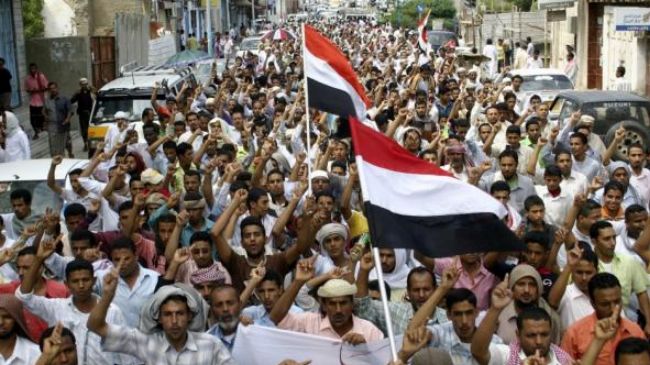
The Day the Yemenis Said: We Are God’s Helpers...!
Let it be written in history’s pages as in the tablets of geography that Washington and Riyadh have completely failed in their unjust aggression against Yemen.
Let it be written that the page of Yemeni self-determination is the only one that will be of a bright white, pleasing to onlookers.
Fifty days of murder, destruction, and a pursuit of desperate attempts to degrade Yemenis resulted in nothing but the affirmation of the saying: "The victory of blood over the sword".
From Washington was its inception, announced by the then Saudi Ambassador to the US administration, and from Camp David was the closing of its curtain by Barack Obama, in time.
Amidst the amazement of the near and far, Sayyed Abdul-Malik Badreddin al-Houthi will appear stronger, more decisive, stronger-willed, and more affirming of the Yemeni’s right to choose the system he wishes and the form of governance he wants.
Has Washington succeeded in seducing the "Old Guard" of Riyadh’s rulers, and employed its greed to swallow Yemen, pitching a virtual political geography so that they would submit to the historical agreement with Tehran that America is working hard for, battling the high seas from the Hormuz Strait to Bab al-Mandeb?
Has the "Democratic American Administration" surpassed one of its greatest challenges with the US interior and the regional exterior with the docking of the Iranian ship "Nejat" on the shores of the Al-Hudaydah port?
A close follower of the American-Iranian dialogue states that Washington was twice mistaken when it green-lighted the Saudis’ futile, unjust war against Yemen. By doing so, it has paved the way for the fall of its historical ally, who will leave this war in desperation, and it has made the probability of completing the "historical agreement" it has promised the American public opinion close to nil.
Fifty days of a futile, unjust war on Yemen not only failed to awaken the Americans, let alone the Saudis, from the nightmare of the closing of the strait of Hormuz, but now America has gambled its interests and those of its allies to face the danger of the closing of the Bab al-Mandeb strait and the loss of the Arabian sea after the sea of Oman.
Followers of the war preparations assert that the Saudi King refused to include Omanis in the advisory meeting that preceded the war by 48 hours under the pretext that the Omanis have become "Iran’s blackbox". Has the moment arrived for Oman to leave the first Gulf war’s alliance against Tehran, which opens the door for the dissolution of the Gulf Cooperation Council?
This is the very sword that it seems Washington was in desperate need for its unsheathing, so that it would ascertain the usefulness of the rule of ad-Dar’iya [the Saudis] or the lack thereof at the time of a rebuilding of a new world order. The time of the partitioning of the Arabian Peninsula has dawned, the same peninsula once forcefully united by the duality of the victors of World War II.
It is the most bitter of tests for all who have gambled on the remnants of a unipolar empire whose stakes in the international system are dwindling, and the same goes for those who gambled on the possibility of exchanging the culture of resistance with the culture of handshaking, and in this instance, dialogue with war once the negotiations were met with obstacles.
History will write in letters of fire and light that the beginning of the end of the Strategic Defense age, and the beginning of the age of Strategic Attack for the axis of resistance was at the hands of the Yemenis- the masters of the Arabian Peninsula, and lords of the seas.
That such a decisive battle was fought with strategic patience and with proper tactics comes naturally to the people of Yemen, for Yemen had transformed the lands of Sheba from the age of the rule of draught and abject poverty to an age beyond the Empty Quarter, where a free, independent, rich Yemen will find prosperity.
New maps will be drawn after the dust settles and gulfs calm, and the quicksand dries- this time, on the land of a truly glad, firm Yemen.
The same genius of space and time from which blossomed a resistance, which made Lebanon a strong and proud state that Arabs and Muslims take pride in, manifested this time on the land of Yemen, whose historical enemies have always portrayed as a failing state that can do nothing but beg for aid from the near and far.
Just as Lebanon switched from the equation of "Lebanon’s strength lies in its weakness" to "Lebanon’s strength lies in the triplicity of the army, the people, and the resistance", a new Yemen will escape the rubble like the Phoenix, casting away the image of the "failed state" it was branded. Thereafter, the age of a strong Yemen will begin, with a golden triplicity baptized in blood, faith, and Yemeni wisdom: the army, the people, and the revolutionary committees...
This would not have been possible had the Yemenis not gathered around one man, resisting the attack on their country, chanting: "We are the helpers who have sacrificed all that we hold precious, and we will continue to do so for the pride of Yemen, Arabhood and Islam, without complaining or seeking favor.
They are the lords of the seas and of the straits, the masters of the plains and mountains, the true victors; as for the others whose assumptions have failed them, they have drank of the poisoned chalice with their involvement in Yemen, and have tasted death.
Let he who still treats these words in suspicion be patient, and await the results of the Camp David summit, and the resumption of the Yemeni dialogue from where it paused before the aggression, for we all lie in wait.
Source: albinaa
